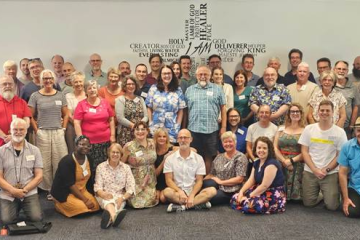Luke 14:1,14; Hebrews 13:1-16
This might be a dangerous question – but what is the longest church service you have ever attended? It could have been here at Canberra Baptist. I seem to remember our anniversary service went for a good while! Or was it elsewhere? A few years ago, Aron and I went to a service in Harlem, New York, where the ‘tourists’ were excused at the two-hour mark. They didn’t seem to think we had the stamina to last the full 3 to 4 hours!
Some of you may have seen this story. Somehow, I missed it over the summer. But eclipsing all those service lengths, a church in The Hague from October last year till January this year, had a worship service that went for 96 days! The Bethel church held this service, not to set a record, but to protect an Armenian family from deportation – Sasun Tamrazyan, his wife Anousche and their children Hayarpi, 21, Warduhi, 19, and Seyran, 15 – because a medieval law in the Netherlands prohibits police from entering places of worship during the service.
The family had previously been granted political asylum, but last year the Dutch government overturned this decision and when their final appeal to stay in the country failed, the church offered them this unusual form of protection; a service that began on the 16th October and only ended on the 30th January when the government agreed to review the cases of families whose children had lived in the Netherlands for longer than five years and grant the majority of them permanent asylum.
The church calculates that during these 96 days they celebrated 2,307 hours of worship; had more than 12,000 visitors (to be a legitimate service three people had to be in attendance at any time and there was a list of phone numbers of neighbours who were ready to join the congregation at a moment’s notice, but it was never needed); the participation of just under 1,000 clergy and 150 volunteers. They practiced traditional and new forms of worship. They met people who had never visited a church service before. There was singing, dancing and meditation. There was Bible reading, preaching and prayer. There were even ‘cleaning services’ where vacuuming was combined with song.
What strikes me as I think about this story is that in the face of a seemingly intractable problem – the UNHCR there are 40 million people displaced in their own countries, 25 million who have fled to neighbouring countries and 3 million who are seeking asylum in industrialised countries; 90% of whom are fleeing from countries close to conflict – war that makes refugees – and 51% of these are children – this church responded by continuing to do what the church does. It chose to continue worshipping. And in continuing to worship it also continued, as our two Bible readings for today illustrate, to do three things that the church also does when and as it worships; it offered hospitality, it demonstrated care and compassion and it witnessed to the life of the Kingdom of God.
“Let mutual love continue,” says our passage from Hebrews. “Do not neglect to show hospitality to strangers, for by doing that some have entertained angels without knowing it.” The Greek word which we translate in English as ‘hospitality’ is philoxenia literally, ‘love of the strange’. In a world where most people did not move far from the place of their birth, where travel was extremely dangerous, as I indicated a few weeks ago in the rundown of Paul’s travel itinerary, people who exercised hospitality, who had ‘love of the strange’ opened themselves to risk, yes, but they also opened themselves to a larger view of the world, to a greater understanding of other people, of other ways of living and being.
I have a couple of copies here of Scott Higgins book, Boundless Plains to Share? (which some of you or one of our small groups might like to use) and in it he tells a story of attending, in his 20s, a conference for future leaders run by the Queen Elizabeth Silver Jubilee Trust. They spent a week listening to presentations from business, political and academic leaders about issues facing Australia in the future and discussing these presentations. Early in the week one academic made a strong case for radically reducing Australia’s immigration programme, including the humanitarian-based intake, and when Scott asked, if, as a wealthy nation, Australia had a responsibility to welcome refuges the consensus was no. He writes, “The sentiment of the room was that although my concern was very admirable, economic and environmental interest must prevail over humanitarian concerns.”
A few days later a woman who had come to Australia from Cambodia as a refugee shared her story. “It was,” Scott says, “an incredible and moving account of a human being who had faced the most violent persecution, took courageous steps to flee her country, and arrived on our shores with no English, no knowledge of our culture and virtually no money. She had struggled to make her way in Australia but over time overcame all the obstacles in from of her and now ran a successful business. The change in sentiment of the conference delegates was astonishing. Two days earlier the delegates had seen her as a threat. Now they saw her as a person, a fellow human being who hoped and dreamed just as they did, who bled and cried just as they did and whose courage in the face of almost unimaginable obstacles commanded their respect and admiration. As they heard this refugee share her story they were drawn into her story and into her life. She became three-dimensional. This didn’t mean we abandoned our discussion of the size of Australia’s immigration programme, but it did mean it was conducted from an entirely different place.”
Hospitality to strangers opens us to new insights. It may even, as Hebrews says, create the possibility of entertaining angels. The reference here is to Abraham and Sarah’s encounter with the divine messengers at the oaks of Mamre (Genesis 18) but the inference is that opening ourselves to the stories and the lives of others, is also the way we open ourselves further to God.
Secondly, the story of the Bethel church in The Hague also illustrates that as the community of faith genuinely worships, it demonstrates care and compassion. Over and over in the Old Testament the people of Israel are told, drawing from their own history of being foreign, of being refugees, “You shall not oppress a resident alien; you know the heart of an alien, for you were aliens in the land of Egypt.” (Exodus 23:9) or, “The alien who resides with you shall be to you as the citizen among you; you shall love the alien as yourself, for you were aliens in the land of Egypt: I am the Lord your God.” (Leviticus 19:34) As British rabbi and member of the House of Lords, Jonathan Sacks points out, the command to ‘love your neighbour’ appears only once in the Hebrew scriptures, but in no less than 36 places we are commanded to ‘love the stranger.’”
Jesus, as we know, built on the command to ‘love your neighbour’ in the story of The Good Samaritan indicating that love for neighbour stretches the boundaries of who our neighbour is, and in, Matthew 25, instructs us to care for the stranger, the hungry, the sick, those in prison, as though they were Jesus himself.
And the early church took this command to love the strange and the stranger seriously. Sociologist, Rodney Stack, point out that the early church grew rapidly in the first century because of its reputation for radical love and care. “During famine and plague, Christians, at immense cost and risk, cared for the weak and sick who had been abandoned, not just their fellow Christians.”
A sign that the worship of God is continuing is the ongoing demonstration of love and are to those who society would prefer to ignore and shut out.
Thirdly the church worships by continuing to point to a city that is to come, by continuing to witness to the life of the Kingdom of God. Christians are identified by hospitality, by care and compassion and by wrestling with when to break with the rules and rulers of our day to reveal another way. As the Seaforth Baptist Church site, which I was looking at recently says, “We are a church of resisters. We are not a comfortable quiet church….Taking Jesus’ words seriously we seek to be led by his teachings and the work of the Spirit in re-imagining what the good life is. “
There are times when, taking into consideration the teaching that Christian people are to obey and to pray for the authorities, Christians have known they must also challenge the authorities and disobey. The instruction in Hebrews to, “remember those in prison as though you were in prison with them, to remember those being tortured as though you yourselves were being tortured,” is an indication their sympathies were to be aligned very differently to the sympathies of their government – perhaps because many of the Christian community found themselves in prison as well. Remembering others in prison as though they themselves were in prison was not so hard to do!
But witnessing to a different way of living and being also requires us to challenge the unwritten rules, the rules – not of our government – but of society. In Luke, Jesus challenges the view that status is everything, that we must maintain our status in society. He encourages people to pursue humility which was rarely considered a virtue in Greco-Romans moral discourse and is viewed similarly as unwise and unprofessional in our modern world. And he goes on, in this passage, to suggests even broader structural upheaval; that hosts, those who control the rules of the game, should subvert it by inviting those who cannot reciprocate and reward in kind, “the poor, the crippled, the lame and the blind”. This, he says, is the kind of behaviour – humility, radical inclusion, thinking outside our own interests – that will be rewarded in kingdom of God.
Which brings us back to the command in Hebrews – not to forget hospitality – and what is so interesting here is that while this was part of first century culture, it was also counter-cultural. If you look back to Hebrews 10 this community had experienced abuse and persecution, imprisonment and the loss of property and possessions, and yet, the writer of Hebrews still encourages them to be hospitable, to be generous, to be open, to keep their lives “free from the love of money and be content with what [they] have.”
I am struck by the challenge that this is for us, for our church at this time. We have a smaller congregation than we have had in the past. We have less money in our offerings and in our reserves. We have our own needs and challenges. And yet we are also being called not to forget hospitality – in our giving, yes, but also in our attitudes of service and care and mission to each other, and to truly be hospitable, to those who are strangers.
To come back to refugees, Scott Higgins’ book also examines the question of how we as a nation can be hospitable, how we can be a good neighbour in the region, what number of refugees we could practically resettle and what the financial cost would be – recognising that in the longer term refugees are a net benefit to our economy and social capital – and that the punitive part of our current short-term solution – overseas detention – is both expensive (over a billion dollars each year) and has untold long-term social costs.
This church has a long legacy of offering hospitality, of demonstrating care and compassion and of challenging and changing attitudes when it comes to refugees. Meryl’s presentation last year, from the arrival of Dat and Ailenh Hoang to our ongoing support of those on Manus Island, demonstrates the richness and the strength of that legacy. And, in this Refugee Week, we should celebrate it and keep on worshipping as the church in this way.
But I know that this is a broad church – not everyone expresses the same views and the same solutions or expresses them in the same way – but I also know that as we keep worshipping together we can keep pressing into what it means to show hospitality – not just to those we know but also to strangers; what it means to demonstrate radical care and compassion; what it means to live outside our own self-interest (or that sometimes of our government) and to live in the Kingdom of God.
As the writer of Hebrews concludes, “Through him then let us continually offer a sacrifice of praise to God, that is the fruit of lips that confession his name…” worship that cannot be separated from the next verse, “Do not neglect to do good and to share what you have, for such sacrifices are pleasing to God.”


